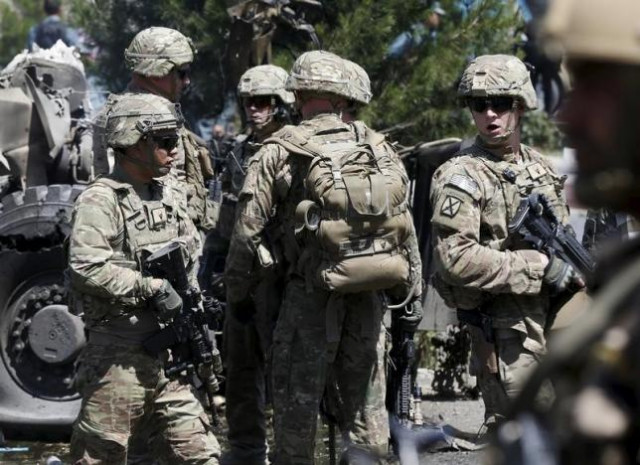America's 14 years in the Afghan quagmire
The war in Afghanistan has claimed 2,372 American lives, according to the specialist website iCasualties

US troops in Kabul, Afghanistan. PHOTO: REUTERS
President Barack Obama's announcement on Thursday he was delaying the pullout of US troops beyond 2016 marks the umpteenth change of strategy aimed at stopping the Afghan quagmire from turning into an all-out military fiasco.
Here are some key facts about the conflict:
Washington ordered troops into Afghanistan in October 2001, the month after the 9/11 attacks, as operation "Enduring Freedom" sought to overthrow the Taliban for refusing to hand over al Qaeda chief Osama bin Laden.
Some 1,000 US soldiers were deployed in November. Their numbers reached 10,000 the following year and rose steadily through the decade, reaching almost 70,000 by 2009, alongside the forces of NATO allies.
That year Obama launched the so-called "surge" in Afghanistan, ordering in another 30,000 troops to battle al Qaeda and a resurgent Taliban.
As US troop numbers peaked at 100,000, Obama announced his intention to pull out of the country starting in July 2011, in line with a key election pledge.
Following through on that plan, the United States had planned to scale back to an embassy-only presence by the end of 2016.
But Obama announced Thursday he would keep a 9,800-strong US force in place through much of next year, admitting Afghan forces are not ready to stand alone.
Washington has poured tens of billions of dollars into the Afghan conflict, split between pure military expenditure, reconstruction and development.
No overall figure exists but partial numbers that are publicly available give an idea of scale.
A Congressional report dated August 17 this year states that "through the end of FY2014, the United States provided about $100 billion to Afghanistan since the fall of the Taliban." Around 60 per cent was used to equip and train the Afghan army, it said.
For fiscal year 2015, which ended on September 30, the figure was $5.7 billion.
As part of the process of handing over to Afghan forces, the Department of Defense "disposed of about $36 billion worth of US military equipment, including 28,000 vehicles and trailers," the report said.
The war in Afghanistan has claimed 2,372 American lives, according to the specialist website iCasualties. The years 2010 and 2011 were by far the deadliest, with 499 and 418 deaths respectively.
Afghans have suffered greatly from over a decade of war. No official toll exists but independent estimates suggest the conflict has claimed 26,000 civilian lives.
The overall human toll in Afghanistan -- taking into account civilians, military and insurgent deaths -- is estimated at 91,000 since 2001.
As the conflict became bogged down, the United States failed to win the trust of the Afghan people, repelled by the continuing loss of civilian lives.
Among the bloodiest single incidents, on August 22, 2008, 90 civilians were killed in a US bombing in the west of the country.
On March 11, 2012 an American soldier murdered 16 civilians in Kandahar province, sparking a surge in anger towards foreign forces.
And on October 3 this year, an American bombing hit a hospital run by Doctors Without Borders (MSF), claiming the lives of 24 patients and medics.
Recent Taliban offensives, most spectacularly in Kunduz in the north, made painfully obvious the inability of Afghan forces to enforce security.
Just as obvious was the failure of US efforts to train up an independent Afghan army in time for the planned drawdown of American troops.
Obama admitted Thursday that "Afghan forces are still not as strong as they need to be."
Security aside, Afghanistan remains wracked by endemic corruption, with crumbling state institutions.
"We cannot separate the importance of governance with the issues of security," Obama said. "The more effectively these reforms happen, the better off the security situation's going to be."
Many analysts consider the US war in Afghanistan to be indissociable from the situation in neighboring Pakistan.
"Sanctuaries for the Taliban and other terrorists must end," Obama said Thursday, announcing his intention to seek Pakistan's help in bringing the Taliban back to peace talks.



















COMMENTS
Comments are moderated and generally will be posted if they are on-topic and not abusive.
For more information, please see our Comments FAQ